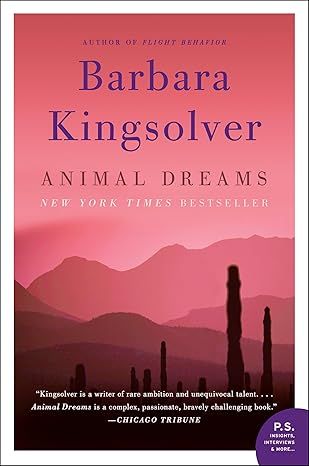Animal Dreams: A Novel
4.4
-
2,888 ratings
“An emotional masterpiece . . . A novel in which humor, passion, and superb prose conspire to seize a reader by the heart and by the soul.” —New York Daily News
From Barbara Kingsolver, the acclaimed author of Flight Behavior, The Lacuna, The Bean Trees, and other modern classics, Animal Dreams is a passionate and complex novel about love, forgiveness, and one woman’s struggle to find her place in the world
"Animals dream about the things they do in the daytime just like people do. If you want sweet dreams, you've got to live a sweet life." So says Loyd Peregrina, a handsome Apache trainman and latter-day philosopher. But when Codi Noline returns to her hometown, Loyd's advice is painfully out of her reach. Dreamless and at the end of her rope, Codi comes back to Grace, Arizona, to confront her past and face her ailing, distant father. What she finds is a town threatened by a silent environmental catastrophe, some startling clues to her own identity, and a man whose view of the world could change the course of her life.
Blending flashbacks, dreams, and Native American legends, Animal Dreams is a suspenseful love story and a moving exploration of life's largest commitments.
This edition includes a P.S. section with additional insights from Barbara Kingsolver, background material, suggestions for further reading, and more.
Kindle
$10.49
Available instantly
Audiobook
$0.00
with membership trial
Hardcover
$11.01
Paperback
$11.19
Ships from
Amazon.com
Payment
Secure transaction
ISBN-10
0062278509
ISBN-13
978-0062278500
Print length
368 pages
Language
English
Publisher
Harper Perennial
Publication date
May 06, 2013
Dimensions
1 x 5.3 x 7.9 inches
Item weight
2.31 pounds
Product details
ASIN :
B000QUCO0S
File size :
3296 KB
Text-to-speech :
Enabled
Screen reader :
Supported
Enhanced typesetting :
Enabled
X-Ray :
Enabled
Word wise :
Enabled
Editorial Reviews
“A glorious tapestry . . . Animal Dreams is rich fodder for our own sweet, satisfying dreams.” — Denver Post
"Rich, complex, witty . . . This is a sweet book, full of bitter pain; a beautiful weaving of the light and the dark. This one will be with us for a long time." — Washington Post Book World
“An emotional masterpiece . . . A novel in which humor, passion, and superb prose conspire to seize a reader by the heart and by the soul.” — New York Daily News
“A novel full of aching sadness—as well as joy, humor, insight and wonderful writing.” — Arizona Daily Star
“Animal Dreams is a novel that feel closer to the truth about modern lives than anything I’ve read in a long time . . . An astonishing book that ought to put Barbara Kingsolver in the first ranks of fiction writers.” — Cosmopolitan
“Animal Dreams literally bursts with life. Its description of how one woman finds her way back from the edge of despair seems absolutely perfect . . . [It] leaves the reader filled with wonder and hope.” — Houston Post
“Barbara Kingsolver demonstrates a special gift for the vivid evocation of landscape and of her characters’ state of mind.” — New York Times Book Review
"Kingsolver achieves a fully realized and profoundly moral vision, one that is rooted in the land and our relationship to it." — San Francisco Chronicle
“Kingsolver is a writer of rare ambition and unequivocal talent . . . Animal Dreams is a complex, passionate, bravely challenging book.” — Chicago Tribune
"Kingsolver probes the human heart with uncommon wisdom. Animal Dreams is a gracefully written, large-spirited novel. Anchored on the earth, it dares to soar into the ethereal." — New York Newsday
"One of the year's best works of fiction." — Detroit News and Free Press
Read more
Sample
HOMERO
1
The Night of All Souls
His two girls are curled together like animals whose habit is to sleep underground, in the smallest space possible. Cosima knows she’s the older, even when she’s unconscious: one of her arms lies over Halimeda’s shoulder as if she intends to protect them both from their bad dreams. Dr. Homer Noline holds his breath, trying to see movement there in the darkness, the way he’s watched pregnant women close their eyes and listen inside themselves trying to feel life.
A slice of white moon from the window divides their bodies deeply into light and shadow, but not one from the other. No light could show where one body ends and the other begins when they’re sleeping like this. Maybe a mother’s eye could tell, but that is the one possibility that can’t be tried.
Halimeda’s bed is still made. In the morning she’ll rumple it so he’ll believe she slept by herself, and then the girls will make it again. Their labors at deceiving him are as careful as surgery. But morning is worlds away now, it’s still early night on the Day of All Souls. The two of them spent the whole day playing in the cemetery with neighbor children, Pocha and Juan Teobaldo and Cristobal and the twin babies, helping Viola Domingos build a bower of marigolds over the grave of a great-grandmother who is no part of this family.
For a long time he stands gripping the door frame, which is exactly the width of a newborn’s skull and curves similarly against his palm. He watches his daughters, though there’s nothing to watch, and thinks these words: “A great-grandmother who isn’t their business.” He decides this will be their last year for the cemetery and the Day of All Souls. There are too many skeletons down there. People count too long on the oblivion of children.
They’re deep in the corpselike collapse that takes hold of children when they are exhausted, but still he won’t risk going in to stand over the bed the way he once would have. He would see the usual things: unraveled braids and the scraped shins hidden from his punishing antiseptics. Tonight he would also see cheeks and eyelids stained bright yellow from marigold pollen. He’s spent a lifetime noticing small details from a distance. From the doorway he smells the bitterness of crushed marigold petals on their skin.
There is a deeper draft of breath and they both move a little. Their long hair falls together across the sheet, the colors blending, the curled strands curving gently around the straight. He feels a constriction around his heart that isn’t disease but pure simple pain, and he knows he would weep if he could. Not for the river he can’t cross to reach his children, not for distance, but the opposite. For how close together these two are, and how much they have to lose. How much they’ve already lost in their lives to come.
COSIMA
2
Hallie’s Bones
I am the sister who didn’t go to war. I can only tell you my side of the story. Hallie is the one who went south, with her pickup truck and her crop-disease books and her heart dead set on a new world.
Who knows why people do what they do? I stood on a battle-ground once too, but it was forty years after the fighting was all over: northern France, in 1982, in a field where the farmers plow blades kept turning up the skeletons of cows. They were the first casualties of the German occupation. In the sudden quiet after the evacuation the cows had died by the thousands in those pastures, slowly, lowing with pain from unmilked udders. But now the farmers who grew sugar beets in those fields were blessed, they said, by the bones. The soil was rich in calcium.
Three years later when my sister talked about leaving Tucson to work in the cotton fields around Chinandega, where farmers were getting ambushed while they walked home with their minds on dinner, all I could think of was France. Those long, flat fields of bonefed green. Somehow we protect ourselves; it’s the nearest I could come to imagining Nicaragua. Even though I know the bones in that ground aren’t animal bones.
She left in August after the last rain of the season. Summer storms in the desert are violent things, and clean, they leave you feeling like you have cried. Hallie had never left me before. It was always the other way around, since I’m three years older and have had to do things first. She would just be catching up when I’d go again, swimming farther out into life because I still hadn’t found a rock to stand on. Never because I wanted to leave. Hallie and I were so attached, like keenly mismatched Siamese twins conjoined at the back of the mind. We parted again and again and still each time it felt like a medical risk, as if we were being liberated at some terrible cost: the price of a shared organ. We never stopped feeling that knife.
But she went. And true to the laws of family physics, the equal and opposite reaction, I was soon packed up too and headed northeast on a Greyhound bus. In our divergent ways, I believe we were both headed home. I was bound for Grace, Arizona, where Hallie and I were born and raised, and where our father still lived and was said to be losing his mind. It was a Sunday. I had a window seat, and in a Greyhound you’re up high. You pass through the land like some rajah on an elephant looking down on your kingdom, which in this case was a scorched bristling landscape and the tops of a lot of cars. It wasn’t all that different from my usual view of life, because I’m tall, like my father and Hallie. I don’t look like who I am. They do, but I don’t.
It was midmorning when I stepped down off the bus in Grace, and I didn’t recognize it. Even in fourteen years it couldn’t have changed much, though, so I knew it was just me. Grace is made of things that erode too slowly to be noticed: red granite canyon walls, orchards of sturdy old fruit trees past their prime, a shamelessly unpolluted sky. The houses were built in no big hurry back when labor was taken for granted, and now were in no big hurry to decay. Arthritic mesquite trees grew out of impossible crevices in the cliffs, looking as if they could adapt to life on Mars if need be.
I was the only passenger getting off. The short, imperious bus driver opened the baggage door and made a show of dragging out luggage to get to mine, as if I were being difficult. A more accommodating woman, he implied, would be content with whatever bags happened to be right in front. Finally he slapped my two huge suitcases flat out in the dust. He slammed the doors and reclaimed his throne, causing the bus to bark like a dog, leaving a cloud of exhaust in the air, getting the last word, I suppose.
The view from here was orchards: pecan, plum, apple. The highway ran along the river, dividing the orchards like a long, crooked part in a leafy scalp. The trees filled the whole valley floor to the sides of the canyon. Confetti-colored houses perched on the slopes at its edges with their backs to the canyon wall. And up at the head of the canyon was the old Black Mountain copper mine. On the cliff overlooking the valley, the smelter’s one brick smokestack pointed obscenely at heaven.
I dragged my bags to the edge of the street. Carlo, my lover of ten years, whom I seemed to have just left, would be sending a trunk from Tucson when he got around to it. I didn’t own very much I cared about. I felt emptied-out and singing with echoes, unrecognizable to myself: that particular feeling like your own house on the day you move out. I missed Hallie. Carlo, too—for the lost possibilities. At the point I left, he and I were still sleeping together but that was all, just sleeping, with our backs touching. Sometimes Hallie would cough in the next room and I’d wake up to find my arm over his shoulder, my fingers touching his chest, but that’s only because it takes your sleeping self years to catch up to where you really are. Pay attention to your dreams: when you go on a trip, in your dreams you will still be home. Then after you’ve come home you’ll dream of where you were. It’s a kind of jet lag of the consciousness.
Carlo loved Hallie. When he and I moved back to Tucson the three of us contrived a little household in a bad neighborhood, with jade plants on our front steps that kept getting stolen till Hallie thought to bolt down the pots. We played house to beat the band. Hallie and I made prickly-pear jelly, boiled and strained and poured blood-red into clean glass jars. We’d harvested the fruits from the physical therapy garden of the hospital where Carlo worked. A nun saw us out there with our grocery sack while she was walking an old man around the little race track, and Hallie and I just waved. We said we were living off the land.
Our home fell apart when she left. She was our center of gravity, the only one of us who saw life as a controllable project. Carlo was an orphan like me. We forgot about the jade plants, they went crisp as potato chips out on the porch, and Carlo withered as if he needed water also. Every man I’d ever loved had loved Hallie best and settled for me. It didn’t bother me as much as you might think; I could understand it. I loved her too.
And now his life with the Noline women had run its course. He could go where he pleased. Carlo was a rolling stone: an emergency-room doctor, which gave him a kind of freedom almost unknown to the profession. You can always find work if you’re willing to take up with a human body as soon as possible after one of life’s traumas has left off with it. Carlo and I met in medical school, and in our years together he and I probably had more addresses than the Grace, Arizona, phone book, Along the way I’d landed a few presentable jobs, but in between I tended to drift, like a well-meaning visitor to this planet awaiting instructions. My career track had run straight down into the weedy lots on the rough side of town. It’s the truth, For the last six months in Tucson I’d worked night shift at a 7-Eleven, selling beer and Alka-Seltzer to people who would have been better off home in bed. There wasn’t a whole lot farther I could go. Now I was here.
A high-school friend, Emelina Domingos, had offered to meet my bus but I’d told her, No, don’t bother, I’ll make my own way. The plan was for me to live in the Domingos’ guesthouse. Not with my father. My relationship with Doc Homer had always improved with distance, which is to say that mail was okay and short, badly connected phone calls were best. I thought I should still keep some miles between us, even though he was ill and conceivably dying. It was going to be touchy. He would be an unwilling candidate for rescue, and I was disaster in that department myself. But he had only two living relatives and the other one was behind the wheel of a Toyota pickup headed for Nicaragua. I stood my suitcases side by side and sat on them for a minute to get my bearings. I think I was hoping Emelina might still show up.
There was no evidence of human life, or life that was ongoing in any obvious way. The one vehicle parked in front of the courthouse, a blue station wagon, had four flats and a bumper sticker stating “ONE DAY AT A TIME.” I suspected it had been there in 1972, the year I finished high school, when I last climbed on a Greyhound and turned my back on Grace. There wasn’t a soul on the street today and I thought of those movies in which a town is wiped clean of its inhabitants, for one reason or another—a nuclear holocaust, say, or a deadly mutant virus—leaving only a shell of consumer goods. The point, I think, is to make some statement about how we get carried away with all our trappings, but this wasn’t the place to shoot a movie like that. Grace hadn’t yet entered the era of parking meters, for example. There were iron rings mortared into the block wall of the courthouse where a person could tie a horse.
I tried to imagine Doc Homer coming downtown on horseback, looking silly, his tall, stiff spine bouncing up and down against his will. I erased the fantasy from my mind, feeling guilty. It was too late to be taking imaginary revenge on my father.
There wasn’t much to Grace’s commercial district. The window of the Hollywood Dress Shop leered from across the street, framing a ferocious display of polyester. The headless mannequins were dressed to the nines, with silver vinyl loafers and red nail polish. If I moved a little I could put my reflection there in the window with them: me in my Levi’s and Billy Idol haircut. (I was the one with a head.) A friend of mine used to make bizarre collages like that—Nancy Reagan in mink among the slaves on an Egyptian mural; Malibu Barbie driving sled dogs in the Iditarod. She sold those things for good money.
The Hollywood Shop was flanked by Jonny’s Breakfast (open all day) and the movie theater. Back behind these buildings ran the railroad tracks. On the other side of Jonny’s were the State Line Bar and the Baptist Grocery. I tried to place myself inside these stores; I knew I’d been there. Directing Hallie through the grocery aisles on a Saturday, ticking off items from Doc Homer’s list. Sitting in Jonny’s afterward, hunched in a booth drinking forbidden Cokes, reverently eying the distant easy grace of the girls who had friends and mothers. But I couldn’t see it. Those things didn’t seem so much like actual memories as like things I might remember from a book I’d read more than once.
I had lied on the bus. I’d told the woman sitting next to me that I was a Canadian tourist and had never been to Grace. Sometimes I used to do that, tell tales on buses and airplanes—it passes the time. And people love you for it. They’ll believe anything if you throw in enough detail. Once I spent a transatlantic flight telling a somber, attentive man about a medical procedure I’d helped develop in Paris, in which human cadavers could be injected with hormones to preserve their organs for transplant. I would be accepting a prestigious medical prize, the name of which I devised on the spot. The man seemed so impressed. He looked like my father.
I didn’t do it anymore, I was more or less reformed. What I’d said that morning was the truest kind of lie, I guess, containing fear at its heart: I was a stranger to Grace. I’d stayed away fourteen years and in my gut I believe I was hoping that had changed: I would step off the bus and land smack in the middle of a sense of belonging. Ticker tape, apologies, the luxury of forgiveness, home at last. Grace would turn out to be the yardstick I’d been using to measure all other places, like the mysterious worn out photo that storybook orphans carry from place to place, never realizing till the end that it’s really their home.
None of this happened. Grace looked like a language I didn’t speak. And Emelina wasn’t coming. I hefted up my suitcases and started to walk.
Oh Lord, the terror of beginnings. I dreaded having to see all the people who were going to say, “How long are you home for, honey?” Possibly they would know I’d come for the school year. We would all carry on as if this were the issue: the job. Not Doc Homer, who’d lately begun addressing his patients by the names of dead people. Since I really did need to come, I’d gotten myself hired to replace the high-school biology teacher who’d recently married and defected without warning. I had practically no teaching qualifications, I should add, and things like that get around. It’s tough to break yourself as news to a town that already knows you. Grace formed its opinions of Hallie and me before we had permanent teeth. People here would remember our unreasonable height in seventh grade, and our unfortunate given names; our father actually named my sister Halimeda, which means “thinking of the sea,” however reasonable a thing that might be to do in a desert. And my own name, Cosima, means something to the effect of “order in the cosmos” which is truly droll, given my employment history. I must have sensed the lack of cosmic order in my future, early on. Maneuvering for approval, I’d shortened it to Codi in the third grade, when Buffalo Bill and the Pony Express held favor with my would-be crowd.
Hallie was a more natural abbreviation, from the time she could walk people never called her anything but that, although Halimeda actually had some truth in it; she made you look for things beyond what you could see. I could imagine Doc Homer dreaming up these names, confident we’d both take noble courses. Suddenly I felt dragged down by emotions as I walked along, as if I’d swum out into a calm sea and encountered a bad undertow. I carried my suitcases toward the edge of town.
An old, densely planted pecan orchard stretched out from the edge of the courthouse square, and somewhere behind it lay Emelina’s place. The reflected sky ran like a vein of silver in the irrigation ditch, but when I left the street and stepped under the canopy of trees it was dark. If you’ve never walked through an old orchard, you have to imagine this: it presents you with an optical illusion. You move through what looks like a hodgepodge thicket of trees, but then at intervals you find yourself at the center of long, maddeningly straight rows of trees, standing like soldiers at attention. There’s a graveyard in northern France where all the dead boys from D-Day are buried. The white crosses reach from one horizon to the other. I remember looking it over and thinking it was a forest of graves. But the rows were like this, dizzying, diagonal, perfectly straight, so after all it wasn’t a forest but an orchard of graves. Nothing to do with nature, unless you count human nature.
A bird scream rang out from the leaves and echoed up my spine with a shiver that ended in my scalp. I believe it was the first sound I’d heard since the gear grinding of the bus. I stopped to listen. Quiet. Then another bird answered from behind me, close by. It sounded like the throaty, exotic laughter of a foreigner—like a jungle bird. The peacocks. These orchards were full of peacocks, living more or less wild and at the mercy of coyotes but miraculously surviving in droves. There was a local legend, supposedly true, about how they got here a hundred years ago: the nine blue-eyed Gracela sisters came over from Spain to marry nine lucky miners in the gold camp, sight unseen. Back then these hills were run through with gold veins and drew a crowd of men who had too much money and too little love. The sisters were just children, and only agreed to come if they could bring their birds with them in the hold of the ship. Their legacy in Gracela Canyon was a population of blue-eyed, dark-haired descendants and a thousand wild peacocks. Their father stayed behind and got rich by proxy, for he’d literally sold his girls for a gold mine.
The branches were ringing with bird calls now. And I could hear kids laughing. A whole chorus of them screamed at once. Toward the far end of the orchard I could make out children’s silhouettes jumping and dancing under the trees. It was dark in there for midday but I definitely saw kids: little girls in billowy dresses and boys in white shirts. I couldn’t make out their game. The tallest boy had a stick and they were chasing something and flailing at it. I walked down the row toward them, towing my bigger suitcase like an anchor. I was traveling light in theory, but I’d dragged with me into Grace a substantial reference library. It had taken me a lot of nervous weeks to narrow down what books to bring. At the very last minute I’d thrown out Gray’s Anatomy because Doc Homer would have it.
I stepped over the irrigation trenches, mindful of my Italian leather uppers. I’m picky about shoes, and there was no replacing these now. I smiled, thinking of the awful silver loafers in the Hollywood Shop. I envisioned my predecessor at the high school dressed like that, standing in front of a classroom of fifteen-year-olds, twisting her white chiffon scarf as she explained cell division. What would these kids make of me? My shoes were pointed and my, as the magazines say, personal style leaned toward apologetic punk. I’d never had a teacher who looked like me; probably there was a reason.
I stopped to massage my aching shoulder. There was something up there at the edge of the orchard all right, a bunch of kids, and something in the trees over their heads. I thought about skirting around the little gang to avoid spoiling their fun, or maybe, actually, because I was afraid. I tried to move quietly. Whatever it was they were chasing, they were going to get it.
I could see plainly then that it was a heavy-bodied peacock shuffling from side to side on a low branch. Apparently the creature was too dull-witted or terrorized to escape, or possibly already injured. The children pursued it ferociously, jumping up and pulling at its long tail feathers, ready to tear it to pieces. The boy with the stick hit hard against the belly and they all shrieked. He hit it again. I couldn’t see the stick but I heard the sickening whack when it made contact.
I looked away. I’d arrived in Grace, arrived at that moment in my life, without knowing how to make the kind of choice that was called for here. I’m not the moral guardian in my family. Nobody, not my father, no one had jumped in to help when I was a child getting whacked by life, and on the meanest level of instinct I felt I had no favors to return. Especially to a bird. It was Hallie’s end of my conscience that kept pinching me as I walked. I dropped my bags and walked a little faster, trying to think of some commanding thing to say. If they didn’t stop soon the thing would be maimed or dead.
“Stop it!” I yelled. My heart was thumping. “You’re killing that bird!”
The boy froze like a rabbit in headlights. The other kids, down on their knees, stared too. I’d arrested them in the act of grabbing fistfuls of bright paper and candy that sparkled on the ground. The mute peacock swung over their heads on a wire. Its fractured body hung in clay shards the size of plate, held together by a crepe-paper skin.
When I was ten I’d demolished a piñata exactly like this one, with blue paper wings and a long glossy tail of real feathers. At a birthday party. At some time or other every child in Grace had done the same.
After an impossible few seconds they went back to scrambling for their prize. Two older girls helped the smallest kids scoop candy into piles in their laps. A cluster of boys elbowed and slapped each other behind the girls’ backs.
I felt disoriented and disgraced, a trespasser on family rites. I walked away from the little group of kids back toward the place in the center of the orchard where I must have left my suitcases. I wondered in what dim part of Grace I’d left my childhood.
Read more
About the authors
Barbara Kingsolver
Barbara Kingsolver was born in 1955 and grew up in rural Kentucky. She earned degrees in biology from DePauw University and the University of Arizona, and has worked as a freelance writer and author since 1985. At various times she has lived in England, France, and the Canary Islands, and has worked in Europe, Africa, Asia, Mexico, and South America. She spent two decades in Tucson, Arizona, before moving to southwestern Virginia where she currently resides.
Her books, in order of publication, are: The Bean Trees (1988), Homeland (1989), Holding the Line: Women in the Great Arizona Mine Strike (1989), Animal Dreams (1990), Another America (1992), Pigs in Heaven (1993), High Tide in Tucson (1995), The Poisonwood Bible (1998), Prodigal Summer (2000), Small Wonder (2002), Last Stand: America's Virgin Lands, with photographer Annie Griffiths (2002), Animal, Vegetable, Miracle: A Year of Food Life (2007), The Lacuna (2009), Flight Behavior (2012), Unsheltered (2018), How To Fly (In 10,000 Easy Lessons) (2020), Demon Copperhead (2022), and coauthored with Lily Kingsolver, Coyote's Wild Home (2023). She served as editor for Best American Short Stories 2001.
Read more
Reviews
Customer reviews
4.4 out of 5
2,888 global ratings
Mary E. Trimble
5
Animal Dreams: A Novel by Barbara Kingsolver, reaffirms my high regard for this acclaimed author.
Reviewed in the United States on June 28, 2021
Verified Purchase
Animal Dreams: A Novel by Barbara Kingsolver, reaffirms my high regard for this acclaimed author. The contemporary story takes place in America’s Southwest.
Codi Noline returns to her childhood home in Grace, Arizona when she learns her father, the small town’s only physician, is dying of a brain disease. When Codi was three years old, her mother died giving birth to her sister, Hallie. Growing up, the two girls were inseparable, but they had a difficult, distant relationship with their father.
Codi can’t bear the thought of living in her father’s house, but is invited to use the guesthouse of a high school friend who is married with five children.
Codi’s sister Hallie, who has a degree in integrated pest management, leaves for Nicaragua to share her knowledge of growing crops. Codi receives periodic letters from Hallie telling of her experiences and fears while in Central America. Codi considers Hallie “a cross between Johnny Appleseed and a freedom fighter.”
Although Codi considers herself a medical school drop-out, a well-trained bag lady, she is highly educated and is temporarily hired by the school district to teach high school biology. The Grace area has had deteriorating agriculture due to local mining operations. Codi takes her students on a field trip to test the soil and water. Together they confirm recent studies claiming the soil is so damaged it has the approximate pH of battery acid.
While at a social gathering, Codi sees an old high school boyfriend, handsome Apache Loyd Peregrina, whose gentle humor and wise perception fill an emptiness Codi has carried for years. Together, they visit places of his youth and she learns of the Southwest’s rich history.
Animal Dreams is a passionate, complex novel of love, forgiveness and one woman’s struggle to learn what “home” means. It’s full of warmth and wisdom, especially from Loyd: “It’s one thing to carry your life wherever you go. Another thing to always go looking for it somewhere else.”
Read more
7 people found this helpful
Angiegirl
5
Angieville: ANIMAL DREAMS
Reviewed in the United States on February 26, 2010
Verified Purchase
I'm a sucker for reading other people's favorite books of all time. When someone tells me a certain book is one of the books of their life, I get this pressing urge to run out and secure a copy. It generally doesn't matter what genre or style of book it is. I think this is mostly because I know what it means to care so much about a book you have to have it nearby at all times. Maybe you own more than one copy so that if you lend one out you've still got a spare...just in case. Maybe you can't remember a time when you hadn't read and loved that book, those characters. I know what that feels like. And because I have such tender feelings for certain books, I want to have read the books others feel the same way about. It's almost always a rewarding experience. One of the most memorable of these times happened several years ago when a good friend of mine on Readerville was talking about what a superb novel Barbara Kingsolver's ANIMAL DREAMS was. I had read one Kingsolver book at that point--
Read more
26 people found this helpful
ranae beyerlein
5
Not Your Elmore Book
Reviewed in the United States on August 31, 2013
Verified Purchase
Recently on Facebook, Elmore Leonard was quoted when giving tips to aspiring writers, saying, in other words, show, don't tell. He also suggests eliminating the parts you'd skip if you were reading the novel. I chuckled when I read these things. I just had finished reading Solzhenitsyn without skipping a thing. Leaonard said no one cares how the characters look, or how the scenery appears, bragging that he doesn't include those details in his books. He forsakes speaking of weather. Kingsolver, one of my favorite authors, violates all of Elmore's rules. Elmore envisions himself a minimalist, evoking self-images of Hemmingway; his characters are seedy, and while interesting, they are shallow, predictable cliches. Kingsolver's characters have depth, and she weaves the story like the wool ponchos I imagine her female characters wearing in this story, textured and detailed with life's stories depicted in the fabric. Her characters are palpable, rather than predictable, have depth and delve into meaningful work. If anything, she tries to tackle too many controversies, to out too many issues in one small book, taking on too much. But she deals with contemporary issues, from politics to feminist proclivities, chastising America's imperialism. I love her insertions about scenery, weather, living things and people's quirks. She writes a woman's voice, singing a jazz rhythm.
Read more
6 people found this helpful
M. Owens
5
animal dreams
Reviewed in the United States on July 14, 2013
Verified Purchase
This will not be an objective review, I get a bit sappy over Kingsolver's work. I'm not alone. In this first person narrative, Cosima Nolina (Codi) returns to her home in Grace, AZ, looking for many things, among them, herself. So far, her life has been one of incompletions, a love affair that fizzled, a medical education abandoned at the last minute. Her former life in Grace was difficult. She and her sister, Hallie, were raised by a single parent, a conflicted, rigid father who was also the town doctor. As if being tall weren't enough (Hallie about six feet, Codi, just under), he forced them to wear orthopedic shoes for most of their early years, further isolating them from their peers. Now Hallie has gone off to improve agricultural practices in Nicaragua, and Codi has returned to Grace to resolve some of the demons within. The setting is so strongly rendered as to be a character in itself. Grace was named after a troup of sisters who were sent there (sold) by their father many years before. Kingsolver offers up painstaking, careful detail of the countryside and pueblo architecture. Among the many conflicts set forth, the trees in Grace are dying. A local mine is spewing forth acid rain. Saving the water supply, and the village becomes one of Codi's primary tasks. Suffice it to say, there are enough twists and turns to keep the reader turning pages. Even more than that, there are the characteristic Kingsolver insights: About her sister: "I spent a long time circling above the clouds, looking for life, while Hallie was living it." About her love interest, Loyd: "You can't know somebody, I thought, till (sic) you've followed him home." About bread served to her: "It had a hard brown crust and a heavenly, steaming interior, and tasted like love." About her family: "Family constellations are fixed things: they don't change just because you've learned the names of the stars." What's not to like? A great read!
Read more
5 people found this helpful

Wendeborg
5
Animal Dreams by Barbara Kingsolver
Reviewed in the United States on May 18, 2014
Verified Purchase
This was Barbara Kingsolver's third novel, and it shows her great understanding of nature, humanity and how love really is all we need. The story is about Cosima, a woman struggling to find her place in the world. She returns to her childhood hometown of Grace to live with a friend ands begins to relearn her relationships with her dying father, neighbours, former lover and absent sister.
Codi (as Cosima is known) learns that her sister, Hallie, has signed up to help the Nicaraguan farmers who are living under the threat of U.S.- backed Contra insurgents. Codi says:'All I want is to be like you,to be brave, to walk into a country of chickens and land mines and call that home, and have it be home. ' - p. 200
Codi's ex-boyfriend from her teenage years, Loyd, reappears and they take up once again. Loyd does not know that Codi was pregnant with his child when she was fifteen, but miscarried and buried the feotus secretly. Loyd is a home loving type of person, who genuinely wants to make a life with Codi, but she is too self-loathing to see it, and plans to move on when the school term ends. Loyd introduces Codi to the Indian pueblos, and landscape: 'The sandstone had been carved by ice ages and polished by desert eons of sandpaper winds. The place did not so much inspire religion as seemed to be religion itself.' - p.210
This book overs so much of what is important and beautiful in the world, it is sad and funny and most of all, meaningful.
Without giving the ending away, Codi goes through a transformation during her Year of Grace. Of the townspeople she says: 'In their eyes my life should have been simple, purely a matter of love and he right wardrobe. It was as if I had fifty mothers.' - p. 311
Read more
9 people found this helpful
Top Barbara Kingsolver titles
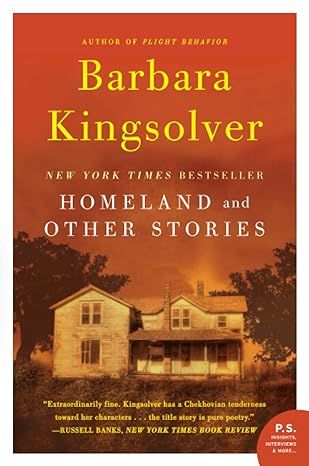
Homeland: And Other Stories
4.2
-
691
$5.24
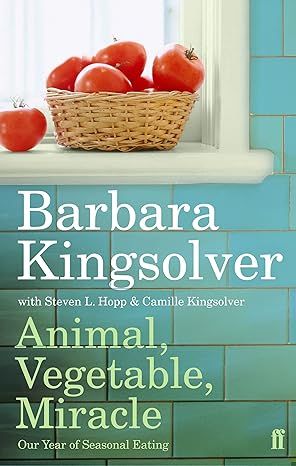
Animal, Vegetable, Miracle: Our Year of Seasonal Eating
4.5
-
2,496
$7.96
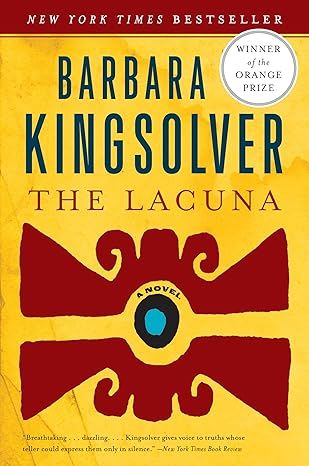
The Lacuna: A Novel (P.S.)
4.4
-
4,450
$1.77
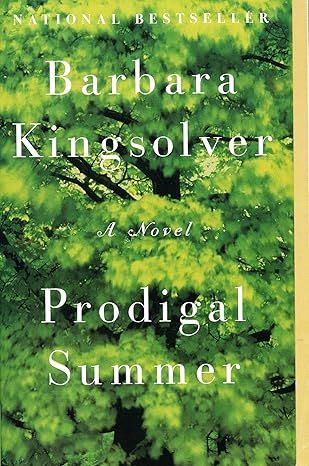
Prodigal Summer: A Novel
4.4
-
6,309
$8.99
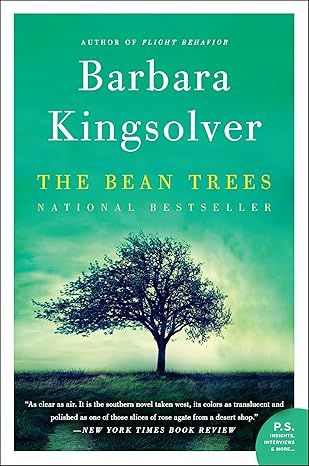
The Bean Trees Anniversary Edition: A Novel
4.4
-
11,504
$2.41
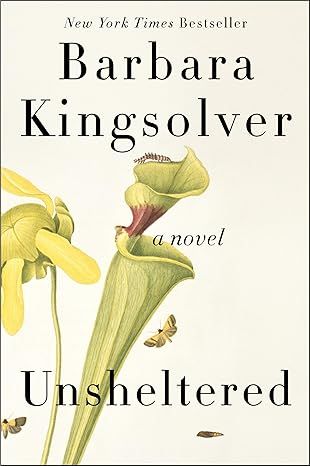
Unsheltered: A Novel
4.2
-
12,750
$5.24
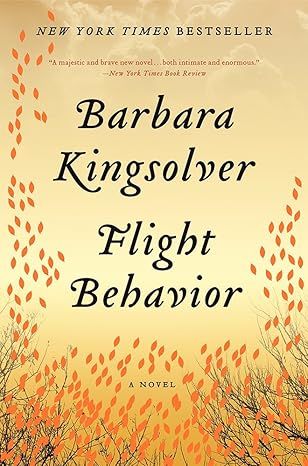
Flight Behavior: A Novel
4.3
-
9,479
$1.84
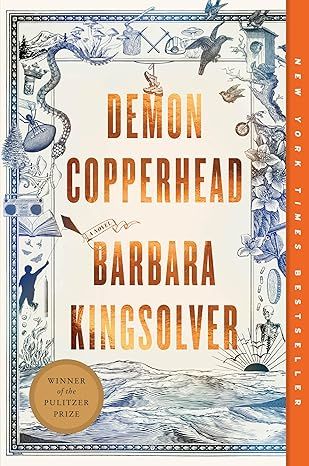
Demon Copperhead: A Novel
4.6
-
110,129
$16.99
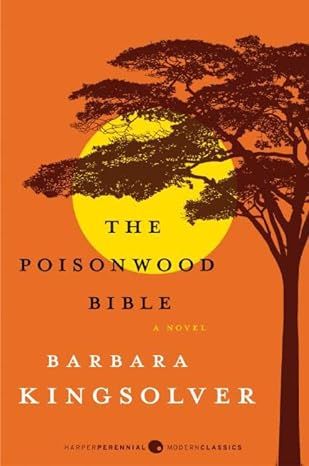
The Poisonwood Bible: A Novel
4.5
-
16,256
$12.69
Best Sellers

The Tuscan Child
4.2
-
100,022
$8.39

The Thursday Murder Club: A Novel (A Thursday Murder Club Mystery)
4.3
-
155,575
$6.33

Sapiens: A Brief History of Humankind
4.6
-
140,302
$13.49

The Butterfly Garden (The Collector, 1)
4.3
-
88,556
$9.59

Things We Hide from the Light (Knockemout Series, 2)
4.4
-
94,890
$11.66

The Last Thing He Told Me: A Novel
4.3
-
154,085
$2.99

The Perfect Marriage: A Completely Gripping Psychological Suspense
4.3
-
143,196
$9.47

The Coworker
4.1
-
80,003
$13.48

First Lie Wins: A Novel (Random House Large Print)
4.3
-
54,062
$14.99

Mile High (Windy City Series Book 1)
4.4
-
59,745
$16.19

Layla
4.2
-
107,613
$8.99

The Locked Door
4.4
-
94,673
$8.53
